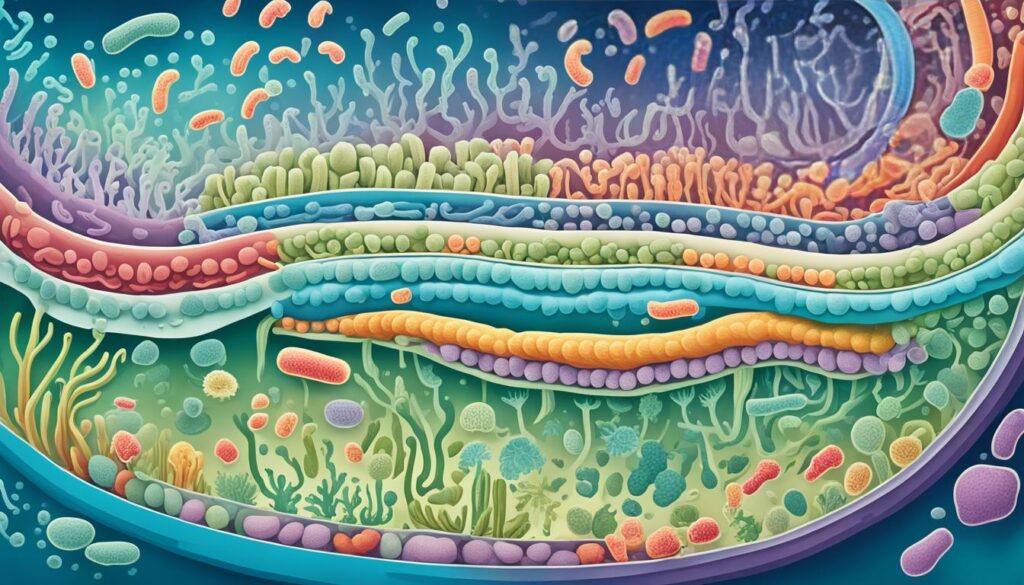Did you know that the human gut is home to trillions of microorganisms, outnumbering our own cells by 10 to 1? That’s right, our gut is teeming with a vast and diverse community of bacteria, viruses, fungi, and other microbes that collectively make up our gut microbiota. But what does this surprising fact have to do with our overall well-being?
The importance of gut health goes far beyond digestion. In fact, scientific research has unveiled the crucial role that our gut microbiota plays in maintaining our overall well-being. This complex ecosystem interacts with various physiological systems in the body, including the immune, nervous, and metabolic systems. When our gut microbiota is balanced and thriving, it contributes to a strong immune system, a balanced mood, and protection against numerous diseases, such as anxiety, depression, hypertension, cardiovascular diseases, obesity, diabetes, inflammatory bowel disease, and even cancer.
Researchers worldwide are conducting clinical studies to delve deeper into the specific microbial species and their impact on our health and disease. Understanding the importance of a healthy gut and the intricate relationship between our gut microbiota and overall well-being can empower us to make informed choices and take proactive steps to optimize our gut health.
Key Takeaways:
- Gut health is of utmost importance for our overall well-being.
- The gut microbiota, comprising trillions of microorganisms, plays a crucial role in our health.
- A healthy gut microbiota is essential for a strong immune system, balanced mood, and disease prevention.
- Imbalances in the gut microbiota have been linked to various diseases, including anxiety, depression, obesity, and cancer.
- Research is ongoing to further understand how our gut microbiota influences our health and disease outcomes.
The Significance of Gut Microbiota in Human Health
The human gut microbiota is a complex community of microorganisms that colonize the gastrointestinal tract. It consists of bacteria, viruses, archaea, and unicellular eukaryotes. The gut microbiota has been classified as a “vital organ” due to its multidirectional and communicational connection with other organs through various pathways.
The composition of the gut microbiota is influenced by factors such as diet, lifestyle, age, and environmental factors, with diet being a major contributor. This dynamic ecosystem of the gut microbiota is responsible for a wide range of physiological activities.
- Metabolism: The gut microbiota plays a crucial role in the metabolism of dietary components, influencing the absorption and utilization of nutrients.
- Barrier function: Gut microbiota interactions help maintain the integrity of the gut barrier, preventing the invasion of harmful pathogens into the bloodstream.
- Inflammation: The gut microbiota has a significant impact on the immune system, influencing inflammatory responses and immune regulation.
- Hematopoiesis: Gut microbiota influences the production and regulation of blood cells, an essential process for overall health.
Dysbiosis of the gut microbiota, which refers to an imbalance in the microbial community, has been associated with various diseases. Imbalances in the gut microbiota have been linked to conditions such as inflammatory bowel disease, obesity, diabetes, allergies, and even mental health disorders.
“The gut microbiota is a key player in maintaining a healthy immune system, influencing our metabolism, and even affecting our mood. Understanding its significance is crucial for maintaining optimal health and preventing disease.” – [Insert Expert Name]
Recent Discoveries in Gut Microbiota Research
Research into gut microbiota health and disease is rapidly advancing, with new findings shedding light on the complex interactions of the gut microbiota and its impact on human health. Recent studies have highlighted the importance of specific microbial species in maintaining gut homeostasis and preventing disease.
For example, the presence of certain bacterial strains, such as Bacteroidetes and Firmicutes, has been associated with a healthy gut microbiota. Conversely, an overabundance of opportunistic pathogens, such as Clostridium difficile, can lead to gut dysbiosis and increase the risk of infection.
Emerging evidence also suggests that gut microbiota interactions extend beyond the gut itself. The gut-brain axis, a bidirectional communication system between the gut and the brain, highlights how the gut microbiota can influence emotions, behavior, and mental health. This exciting area of research opens up new opportunities for novel therapeutic interventions targeting the gut microbiota.
| Gut Microbiota | Significance |
|---|---|
| Metabolism | Plays a crucial role in the metabolism of dietary components and influences energy balance and weight regulation. |
| Immune System | Helps develop and maintain a well-functioning immune system, protecting against infections and autoimmune diseases. |
| Brain Health | Impacts brain development, behavior, and mental health through the gut-brain axis. |
| Disease Prevention | A healthy gut microbiota can lower the risk of various diseases, including gastrointestinal disorders, metabolic diseases, and mental health conditions. |
To fully understand the significance of gut microbiota in human health, ongoing research is uncovering the complexities and interactions of this microbial community. By gaining a better understanding of gut microbiota health and disease, we can develop targeted interventions and treatments to promote a healthy gut and overall well-being.
Gut Microbiota and Metabolic Functions
The gut microbiota plays a significant role in the metabolism of dietary components and xenobiotics. It has the ability to metabolize various food components, drugs, pollutants, and pesticides, affecting the bioavailability and metabolism of these substances in the body. This intricate process has a direct impact on our overall health and well-being.
One of the key areas where gut microbiota influences our metabolism is energy homeostasis. Energy balance is essential for maintaining a healthy weight and preventing obesity-related disorders. Studies have shown that gut microbiota diversity and the production of short-chain fatty acids (SCFAs) play a critical role in regulating energy balance and insulin resistance.
The gut microbiota has the ability to ferment dietary fibers and produce SCFAs such as acetate, propionate, and butyrate. These SCFAs act as an energy source for the host, and they also have an impact on appetite regulation, glucose metabolism, and lipid metabolism. By modulating the production and availability of SCFAs, the gut microbiota can influence the storage and utilization of energy in the body.
The gut microbiota also plays a role in the metabolism of bile acids. Bile acids are essential for the digestion and absorption of dietary fats. The gut microbiota can modify bile acid metabolism, affecting lipid metabolism and potentially contributing to the development of metabolic disorders.
The intricate relationship between gut microbiota metabolism and our overall metabolic functions highlights the importance of maintaining a healthy gut microbiota. Imbalances in the gut microbiota, known as dysbiosis, can disrupt metabolic processes and contribute to the development of metabolic disorders, including obesity, diabetes, and cardiovascular diseases.
Understanding the complex interplay between the gut microbiota, metabolism, and metabolic disorders is essential for developing strategies to promote and maintain optimal metabolic health. Ongoing research in this field aims to unravel the specific mechanisms by which the gut microbiota influences metabolic functions and explore potential therapeutic interventions for metabolic disorders.

Further research and advancements in gut microbiota science will shed more light on the intricate connection between gut microbiota and metabolic functions, paving the way for innovative approaches in preventing and managing metabolic disorders.
Gut Microbiota Diversity and Human Health
Gut microbiota diversity is a crucial factor in maintaining a healthy gut and promoting overall human health. Research has shown that a lower diversity of gut microbiota is strongly associated with several health conditions, including inflammatory bowel disease, psoriatic arthritis, type 1 and type 2 diabetes, obesity, and arterial stiffness. This reduced diversity indicates a state of gut microbiota dysbiosis, characterized by an imbalance in the microbial community.
Gut microbiota dysbiosis has been implicated in the development of various diseases, including autoimmune disorders and metabolic disorders. When the microbial community becomes imbalanced, it can lead to chronic inflammation, compromised immune function, and impaired metabolic processes. Understanding the role of gut microbiota diversity in these diseases can provide valuable insights into potential treatment strategies.
The gut microbiota is influenced by various environmental factors, such as diet, drugs, and anthropometric measures. Diet, in particular, plays a significant role in shaping the composition of gut microbiota. A balanced and diverse diet that includes plenty of fiber, fruits, vegetables, and fermented foods can promote a healthy gut microbiota. On the other hand, a diet high in processed foods, sugar, and saturated fats can disrupt the microbial balance and contribute to dysbiosis.
In addition to dietary factors, medications such as antibiotics can also have a significant impact on the gut microbiota. Antibiotics, while effective in treating bacterial infections, can also eliminate beneficial bacteria in the gut, leading to dysbiosis. It is important to consider these factors when evaluating gut health and developing interventions to improve microbiota composition.
Fortunately, interventions such as dietary changes and fecal microbiota transplantation (FMT) have shown promise in modulating the gut microbiota and improving health outcomes. By adopting a diet rich in fiber and fermented foods and reducing the consumption of processed foods, individuals can promote a diverse and healthy gut microbiota. FMT, which involves transplanting fecal matter from a healthy donor into the gut of an individual with gut microbiota dysbiosis, has shown remarkable success in restoring microbial balance and improving symptoms in certain diseases.
To summarize, gut microbiota diversity is a vital aspect of gut health and overall human health. Maintaining a diverse and balanced gut microbiota is essential for preventing the development of diseases and promoting optimal well-being. By understanding the role of gut microbiota diversity in health and disease, we can make informed choices about our diet, lifestyle, and treatment options to support a healthy gut microbiota.
| Health Condition | Association with Gut Microbiota Diversity |
|---|---|
| Inflammatory Bowel Disease | Lower diversity of gut microbiota has been observed in individuals with inflammatory bowel disease. |
| Psoriatic Arthritis | Reduced diversity of gut microbiota is associated with psoriatic arthritis. |
| Type 1 and Type 2 Diabetes | Lower diversity of gut microbiota is observed in individuals with type 1 and type 2 diabetes. |
| Obesity | Gut microbiota dysbiosis is more common in individuals with obesity. |
| Arterial Stiffness | Reduced diversity of gut microbiota is linked to arterial stiffness. |
Influence of Food and Drugs on Gut Microbiota
The composition of gut microbiota is influenced by the specific foods we consume, our dietary patterns, and even the drugs we take. Certain foods and dietary patterns have been found to promote the growth of beneficial bacteria and diversify the gut microbiota, while others can negatively impact its balance and lead to dysbiosis.
High-fiber diets, plant-based diets, and fermented foods have been shown to contribute to the growth of beneficial bacteria in the gut and enhance the overall diversity of the gut microbiota. These foods are rich in nutrients that support the growth of beneficial microbes, helping to create a healthy microbial balance in the gut.
On the other hand, diets high in processed foods, sugar, and saturated fats can have detrimental effects on the gut microbiota. These foods can promote the growth of harmful bacteria and reduce the diversity of the gut microbiota, which can disrupt its proper functioning.
In addition to food, certain medications and drugs can also impact the gut microbiota. Antibiotics, for example, can disrupt the balance of gut bacteria by eliminating not only harmful bacteria but also beneficial ones. This can lead to dysbiosis and potential health implications.
To modulate and optimize the gut microbiota, probiotics and prebiotics can be used. Probiotics are live bacteria that, when consumed in adequate amounts, can confer health benefits by replenishing and balancing the gut microbiota. Prebiotics, on the other hand, are dietary fibers that serve as food for the beneficial bacteria in the gut, helping them thrive and maintain a healthy microbial community.
Understanding the relationship between food, drugs, and the gut microbiota is essential for optimizing gut health and overall well-being. By making conscious choices about our diet and being mindful of the medications we take, we can positively influence the composition and balance of our gut microbiota, supporting a healthy digestive system and overall health.

